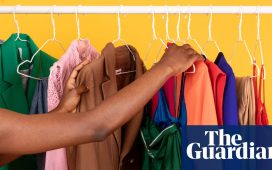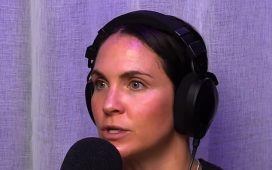Tom Daley sounds as if he’s still in shock. Britain’s most celebrated diver recently returned from visiting various Commonwealth countries to investigate LGBTQ+ rights. Of course he knew there were issues; that in much of the Commonwealth homosexuality is still criminalised, thanks to the British empire exporting draconian homophobic laws to the colonies in the 19th century. But knowing something is different from meeting the people who live with those threats on a daily basis. It has changed so many of his views, he says – not least on what it means to be British.
It all started last October, when he said during a TV interview that he didn’t think countries with discriminatory LGBTQ+ laws should be allowed to host major international sporting events. He was then invited to deliver C4’s alternative Christmas message, by which time he had refined his position. “In 2022, the World Cup is being held in the second most dangerous country for queer people, Qatar. Why are we allowing places that aren’t safe for all fans and for all players to host our most prestigious sporting events? Hosting a World Cup is an honour. Why are we honouring them? Holding a Formula One grand prix is an honour. Why are we honouring Saudi Arabia?”
Earlier this year, BBC producers suggested that in the buildup to the 2022 Commonwealth Games he should find out for himself just how hard it is to live as a gay athlete in countries that criminalise homosexuality. Making the resulting documentary sickened and inspired him in equal measure. Since then, he’s done a volte-face about banning homophobic countries from hosting major sports events, and created a manifesto for LGBTQ+ inclusiveness that he is hoping will be co‑opted by the committees for everything from the Commonwealth Games to the Olympics.
Daley has so much to say that he doesn’t quite know where to start. So it all pours out at once. “There are so many horror stories. I met an athlete in Jamaica who came in a hoodie, and sat behind a curtain with her voice distorted. She didn’t want me to know her name because their lives are in danger if they are named. In Lahore, I spoke to an athlete that had to remain anonymous because she is incredibly high profile. She had a gay friend who was killed, stoned in the streets. An athlete in Nigeria told me one of his friends got lured in on a dating app, and then was stabbed to death and left to die in a pool of his own blood.”
Again, he stops, appalled. “Did you know 35 of the 56 countries involved in the Commonwealth Games still criminalise same-sex relationships and seven have the death penalty?” The figures are tripping off his tongue now, but they still clearly have the power to disturb him. “In any of these 35 countries, it is illegal to be me. I went on such a wild learning curve,” he says.

Daley is Zooming from the London home which he shares with his husband, Oscar-winning film-maker Dustin Lance Black, and their four-year-old son, Robbie. A stuffed giraffe towers over Daley, to his side is a knitted squid, and on the wall is a coloured alphabet. “This is Robbie’s bedroom,” he says. “We’ve got people around today, so it’s easier for me to be locked away in a quiet space.” Lovely giraffe, I say. He smiles. “We got it from a local flea market. It’s missing an ear. They said you can have it for 25 quid if you keep the name Benson, so it’s Benson the giraffe.” You could have changed his name, and they wouldn’t have known any better, I say. He looks at me, mildly disapproving. “But I’m not that kind of person. I’m an honest person. I couldn’t do it.”
How’s Robbie? “He’s great! Robbie’s got a lot of personality!” Daley tells me he loves to climb up things and jump off them. “It scares the living daylights out of me. Lance says, ‘What do you expect? You climb up things and jump off them for a living.’ When I look back, I wonder how my parents dealt with watching me do what I do every day and not be petrified.” He says Robbie has recently learned to swim. “This time last year he was the only kid in the class who didn’t want to jump in the water!” Can he dive yet? “No, he’s not interested in that.”
He has packed so much into his life, it’s hard to believe Daley is still only 28. I first met him when he was 17 and preparing for the London 2012 Olympics. He looked young for his age (except for the precocious six-pack) but seemed eerily mature, already a veteran. He started diving at seven, became the youngest winner of the senior 10m platform event at the British Championships and the European Championships at 13, competed in the Olympics at 14, won the World Championship at 15, and on it goes. Record after record broken. But that was just the half of it. His trials have been as notable as his triumphs. In 2011, his beloved father, Rob, died of cancer, aged 40. Rob seemed so different from the young Tom – he was big and bluff, and didn’t care what he said to anybody. All he wanted to do was protect and support his family (Tom has two younger brothers).
Sign up to our Inside Saturday newsletter for an exclusive behind-the-scenes look at the making of the magazine’s biggest features, as well as a curated list of our weekly highlights.
And the young Tom did need plenty of support. He was bullied at school after becoming famous, and his mental health suffered. Apart from the extraordinary strength and gymnastic skills required for diving, the demands were relentless – four hours training every day after school, competing regularly away from home, making sure he wasn’t carrying an ounce of fat. And when it went wrong, it was horribly painful. Daley had the scars to prove it. Back in 2012 he showed me a few of his war wounds – a scar on the top of his head, another on his forehead, and a muscular stalactite of scar tissue on his upper arm where he had torn his tricep. He told me that the impact on his body, entering the water at 35mph, was “like having a car crash every time you dive”, and admitted “I still get scared every time I go up there.” His former coach Andy Banks had recently said that as a youngster Tom got so lonely and distressed away from home that he threatened to jump out of a window if he was left alone.
At the London Olympics, Daley won a bronze medal in the individual 10m platform dive. After all he’d recently been through, it felt as if he had won gold. On the podium, he couldn’t stop grinning. He held up his bronze medal, showed it around the arena, then lifted it to heaven for his dad.
I ask Daley whether he is surprised how his life has turned out. If he thinks back to the 13-year-old diving sensation, is this what he would have expected for himself? God no, he says. “There are so many things I’ve done which I wouldn’t have seen myself doing when I was younger, especially being in the forefront of LGBT stuff.” Because it was irrelevant to him back then or he never saw himself being a campaigner? “A little bit of everything. I didn’t understand queer history. And I’ve taken the time to learn and understand and listen.”
If he met 13-year-old Tom today, what would he say to him? “Just keep being you. Keep working hard, keep your head down and keep going. Don’t worry about what other people say, keep being you. That’s what I ended up doing, but it would have been nice to have someone reassure me that it was all going to be OK.”
And how does he think that 13-year-old boy would respond to him? “What on earth have you done?” He giggles. “My dream when I was a kid was to win a gold medal, and I managed that. But my dreams have evolved over the years – to get married, have a family, and if you’d told me I was going to knit and crochet I would have laughed at you, but here we are.” Daley only started knitting a couple of years ago. After he was seen crafting in the stands at the Olympics (including making a fetching pouch for his medals), his skills gained him a whole new fanbase of fellow knitters and crafters. Now he’s got his own knitwear design company, Made With Love.
When he came out in December 2013, he did it in style, on his own YouTube channel with a homemade video called Something I Want to Say. He talked about how much his life had changed over the past couple of years – his father had died, he’d won the Olympic medal and he had passed his A-levels (straight As in maths, Spanish and photography). Then it became more personal. “In spring my life changed massively when I met someone. They make me feel so happy, so safe. Everything just feels great, and that someone is a guy.”
The Sexual Offences Act 1967 legalised gay sex in England and Wales for consenting adults over the age of 21 (it was finally lowered to 16 in 2000), but it continues to be criminalised in most Commonwealth countries. Daley is now fully aware of the number of these countries where he wouldn’t have been able to make such a video. How does it make him feel about Britain? I half expect him to eulogise liberal British values, but he’s not having any of it. He says he feels angry and deceived.
“I learned so much about what British rule did that was not OK. It feels as if we’re trying to erase our history by saying, ‘Look how much we’re bringing people together now.’ But we’ve got to acknowledge what happened. Hearing those stories, I had my head in my hands. I wanted the ground to swallow me up. I felt so dark about my relationship with being British. I came away from it with a really twisted sense of what it meant to be British.” The way you talk about it, I say, you sound as if you feel personal responsibility. “Yes, I do in a sense. That was the twisted part of it. I thought: what can I do? I felt very helpless to be British.”

He reassessed his earlier position on banning homophobic countries from hosting major events when LGBTQ+ athletes and campaigners told him that a ban would be another form of imperialism. “They said, ‘That’s again being an oppressor. It’s not allowing a country to learn and come to the table and grow.’ The number one thing they said they wanted was visibility. Seeing the Pride flag waved is a sign of safety for lots of people.”
The athletes convinced him that a carrot was far more effective than a stick. So rather than an outright ban, he drew up a manifesto with their help, founded on the principle that any country could host the event if they signed a contract saying the Games had to have a pro-LGBT ethos. His manifesto states that host countries must allow Pride flags to be flown and provide Pride Houses (dedicated temporary venues dedicated to LGBTQ+ inclusion, diversity and culture), along with sensitivity training for Games workers. “So rather than saying to certain countries you can’t host it, it’s saying that if you want to host it, you have to change. Instead of banning countries, countries will rule themselves out by accepting they are not appropriate hosts because they do not fit the values of the event.” Daley has already presented his proposals to the Commonwealth Games Federation (CGF). At the opening ceremony, Daley played a prominent role. He led out six athletes and activists, carrying Progress Pride flags, from countries where homosexuality is criminalised. Daley is planning to present his manifesto to all the major international sports events and hopes that it will eventually be adopted worldwide.
Has Britain changed since Daley came out in that YouTube video? “Yes and no. Things have progressed in terms of people that are out and visible. Back in 2013, there weren’t many out athletes at the top of their game. People had either retired or were towards the end of their career. There is a lot more visibility in sport.” And yet, he says, there is still so much progress to be made. He cites football as the most obvious example – there is not a single Premier League footballer who has come out while playing, and only one who has done so since retiring (the German international Thomas Hitzlsperger).
There is another thing that worries Daley. He believes that rightwing populism threatens the gains countries such as Britain and the US have made since the 1960s, and cites the US supreme court overturning Roe v Wade, ruling there is no constitutional right to abortion. “Things are happening in the States with women’s rights. Then the equality of gay marriage has been brought into question. Then not banning trans conversion therapy in the UK. I feel we’re at this pivotal moment in the queer movement in terms of holding on to our rights, which are being chipped away at. They’re almost trying to catch us off guard because the younger generation has never had to fight for that before. I can see how frustrated the older generation are because of what they’ve fought for. And it’s slowly being clawed back. We can’t become complacent and we need to make many alliances. People need to come together as one. There is power in numbers.”
Isn’t part of the problem that the LGBTQ+ community is at war with itself over trans rights? The level of fury between trans rights activists and gender-critical feminists astonishes me, I say. Daley nods, and says it’s dangerous. “The LGBT community is so fractured right now over certain issues. And that’s when the right are going to get us. They’re going to try to break us down. And if you think they’re just going to take away trans people’s rights, you’re wrong. It’s going to go much further than that, and we have to stick together as an LGBTQIA+ community to stop that happening.”
So how can you reconcile such polarised factions? He doesn’t attempt to provide an answer, but says one is needed. “If we don’t do something about it soon, something monumental will happen and we’ll be back at square one. The right wing is very good at making people fight with each other to create tension and division and fear. If you ask the younger generation, nobody cares what somebody’s gender is or what their sexuality is. Everybody just wants to be a human being. First and foremost, our planet is falling apart. If we don’t sort that out and stop arguing about other things, we’re not even going to have a planet to exist on. There are certain people on social media who have a very big platform who can say certain things that get sensationalised …”

Aren’t you one of them, I say. After all Daley has 2.2m followers on Twitter. In June, speaking at the British LGBT awards, where he was named Sports Personality of the Year, he condemned the decision of Fina (the administrative body for international water sport) to ban trans athletes who have been through any part of male puberty from elite women’s competition. Daley said when he heard the ruling, “I was furious. Anyone that’s told that they can’t compete or can’t do something they love just because of who they are, it’s not on. It’s something I feel really strongly about – giving trans people the chance to share their side.”
For so long, Daley has been regarded as a national treasure. But as he takes a more active role in the charged debate about trans athletes, it is inevitable that opinions about him will become divided. In an interview with GB News, former Olympic swimmer Sharron Davies responded to Daley’s speech by suggesting
that as a male athlete he doesn’t have any skin in the game: “Tom is male and this does not affect him in the slightest … I think we have to listen to the women, and Fina were the first governing body since 2015 to actually poll their female athletes and listen to their coaches.”
Fina ruled that transgender women and girls can only compete in elite women’s events if they have not gone through any of the male puberty process, or before they reach the age of 12, whichever is later. Daley believes it is a crude, cruel and dangerous decision. “It puts certain athletes in a very difficult position because they’re either never going to be able to compete again, or their parents are going to have to make decisions just before their children turn 12. That puts a lot of pressure on parents to make those decisions. It’s not the right message to send about sports that trans kids are not welcome if they don’t transition before they are 12.”
Does he think that ultimately inclusion trumps fairness? “No, of course not. But, as human beings, we have to be a little bit more thoughtful before banning people completely from something. If kids are doomed to never be able to do what they love, they may well just give up.” I mention a 2020 study that found trans women retain a 12% advantage in running tests even after taking hormones for two years to suppress their testosterone. “You just have to do all of those studies and have the full understanding before you make any decisions like that. If they find out it takes five years, fine, five years. If it takes six years, fine, then six years. But so much goes into it rather than just being able to make a decision based on one study.”
Your thinking sounds more nuanced than the statement you made at the awards ceremony, I say. “It is more nuanced. Having a conversation is different from having 30 seconds to say something. But overall I still stand by what I said – trans people should never be banned from sport.”
Is the issue dividing fellow athletes? “Yes. There are certain people who have very strong opinions about it one way or another. But people are trying to make it a problem before it is a problem.” He says the number of trans athletes in elite sport is minuscule. “There has never been a trans diver that has stayed in diving, yet people have gone mad about it.”
The issue of trans women even became the battleground for the Tory leadership election. Penny Mordaunt, a contestant on Daley’s ITV celebrity diving show Splash! in 2014, was accused by rivals of being a “woke warrior” for her previous support of trans women. Mordaunt desperately tried to distance herself, insisting she had never claimed “trans women are women”.
Is this what he means by LGBT issues being hijacked? He nods. “Think of the tiny percentage of trans people in the population, and prospective Tory leaders are using that to win votes. I don’t understand why people think they have to be less woke in order to lead a country. “How can understanding people’s feelings be a bad thing?” He trails off, lost for words.
Daley has always been one of life’s planners. I met him again in 2015 when he’d just turned 21 and was living with Black, a prominent campaigner in the fight for US marriage equality. Daley was mapping out his future – a gold medal at Rio, a career in television after diving, marriage and kids at some point. He said he knew he’d be the disciplinarian because he was tougher than Black, despite the fact that his partner was 20 years older. Two years later he and Black married, and in 2018 Robbie was born with the help of an egg donor and a surrogate. Both Daley and Black donated sperm, and said they didn’t want to know who is the biological father.
As for the gold at Rio, that didn’t materialise. He won a bronze in the synchronised 10m with Daniel Goodfellow. This time, coming third felt like a failure. He missed out on an individual medal, and it looked as if he was destined never to land the big one. Then, last year, at the delayed Tokyo Olympics, he finally won gold with his best friend, Matty Lee, in the synchronised 10m, after a series of near-perfect dives. As in 2012, it was one of the emotional highs of the Games. When they realised they had won, Daley jumped into Lee’s arms and wrapped his legs around him. A masked Daley wept on the podium. He also went on to win an individual bronze.

Earlier this year he told me, “The morning after winning an Olympic gold medal was the first morning I woke up and really felt a sense of peace. I knew I’d done everything I wanted to do in this sport. I felt I can finally be happy now.” Has he still got that sense of contentment? “Yes. I don’t think that will ever go away. It’s going to be a year tomorrow!” he says ecstatically.
Daley has not dived since Tokyo, using the time to take stock. He knows it will soon be time to hang up his trunks, but he’s still hoping to go out with a bang at the Paris Olympics in 2024. As for his future, he’s got big plans. At least one more child hopefully. Then there’s a fashion line. “I’d love to expand Made With Love and really go into the world of fashion.” And the TV career. “I’d love to eventually be a TV host.” You’ve already been one, I say. “Yeah, but a proper one. Ant and Dec vibes. Or Holly and Phil.” Blimey, that’s ambitious! “Well you’ve got to be ambitious.”
Meanwhile, his campaigning shows no sign of abating. Would he ever go into politics? “Oooh I don’t know. After seeing the state it’s in at the moment, I don’t know if I’d have the patience with the other people.” It’s hardly a no. He might not have many dives left in him, but it feels as if Tom Daley is just getting started.














